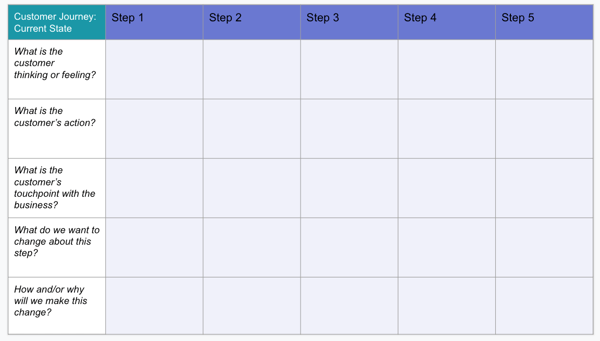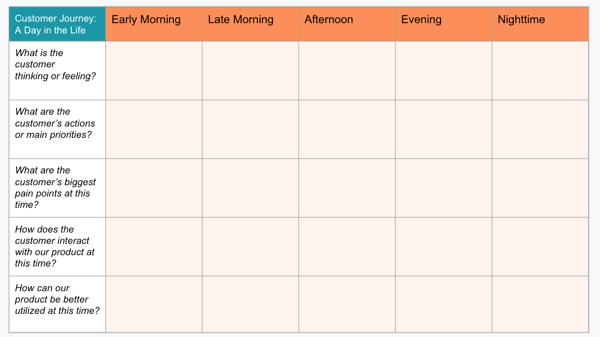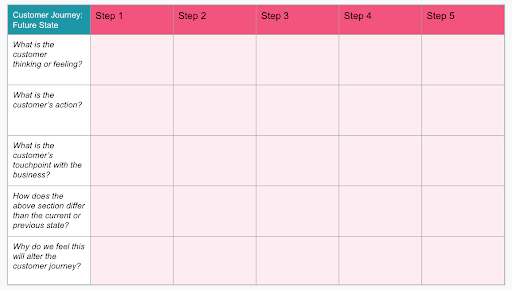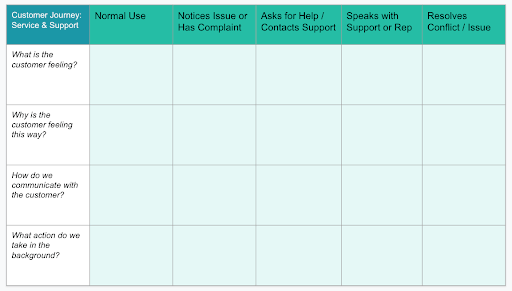4 Proven Customer Journey Map Templates Every B2B Company Needs
Written by
You have an outstanding existing customer base. They’re loyal. They’re active. They’re exactly — or pretty much exactly — as you hoped they would be when you signed them on.
It’s sometimes so easy to get distracted by landing new business that your existing customers get taken for granted. What are you doing to demonstrate their value? What type of experience are you creating for existing customers that will instill even more confidence in the relationship they have with your company?
Understanding why customers take the actions they take, their emotions and motivations while interacting with your company, and the obstacles and pain points they’re trying to overcome is invaluable. It’s also the motivation behind committing to creating a customer journey map template.
Customer Journey, Buyer Journey — It’s All The Same (Not)
It’s a small shift in terminology with big ramifications, so let’s get clear on customer journey vs. buyer journey:
- Customer journey: The process of nurturing and retaining existing customers
- Buyer journey: The process and steps taken to turn prospects into customers
Think of the buyer journey as getting a customer through the door, and the customer journey as giving them every reason to stay.
The Benefits of Customer Journey Mapping
By being intentional about customer experience journey mapping, you view your company through a customer’s lens.
Customer journey mapping tools help you tap into how a customer feels about navigating the journey. How easily they found information, accessed services, transitioned from one touchpoint to the next, etc. — and that knowledge benefits you by helping to:
- Identify and adjust friction points that cause customer disconnect, such as a lack of website optimization, communication breakdown, gaps in service, etc. Any frustration that steals momentum from the sales flywheel could be detrimental
- Reduce costs by improving customer service and managing to the customer journey map — process-driven acts that can boost year over year growth by up to 21%*
- Build sales by deploying a sales cycle that’s up to 18% faster than average, and generate 56% more revenue solely from upselling and cross-selling*
- Increase customer and employee satisfaction as processes are more well-defined, transactions are typically smoother, and expectations are more readily met. Companies using customer experience journey mapping enjoy 24% more positive social media comments than companies that do without*
From an inbound marketing perspective, customer journey mapping makes audience targeting/segmentation more effective, which only amplifies these benefits. Plus, you create a customer-focused mindset throughout your company which leads to more proactivity, better service and communication, and higher retention rates.
RELATED: How to Map Your Customer Journey for More Helpful HubSpot Feedback Surveys
Choosing and Refining Customer Journey Map Templates
Strategically creating a customer journey map template requires first establishing some basic parameters:
- Set clear objectives
- Identify target personas
- Determine all customer touchpoints, including social media platforms
After nailing down the basics, it’s time to clearly define what you want the customer journey map to do and select the template that best fits the purpose within your inbound marketing, sales, and service program. There are several routes to take to customer journey mapping, but these customer journey map examples are the most popular:
1. Current State
A current state customer journey map template captures your customers’ thoughts, actions, and emotions when interacting with your company. The data serves to help in continuous improvement of the customer experience.
 Source: HubSpot, Customer Journey Map: 7 Free Customer Journey Map Templates
Source: HubSpot, Customer Journey Map: 7 Free Customer Journey Map Templates
2. Day In The Life
A day in the life customer journey map template puts customers’ pain points and expectations into the larger context of everyday activities, as opposed to solely in relation to your company. The day in the life template is a glimpse into customer needs and how to address them — often before customers even acknowledge a specific need.
 Source: HubSpot, Customer Journey Map: 7 Free Customer Journey Map Templates
Source: HubSpot, Customer Journey Map: 7 Free Customer Journey Map Templates
3. Future State
A future state customer journey map template logs customers’ anticipated actions, thoughts, and emotions based on their current experience with your company and how adjustments will change the journey. Future state templates generally help solidify vision and objectives.
 Source: HubSpot, Customer Journey Map: 7 Free Customer Journey Map Templates
Source: HubSpot, Customer Journey Map: 7 Free Customer Journey Map Templates
4. Service Blueprint
A service blueprint customer journey map template begins to answer how a stellar customer journey will be delivered. It drills into the people, processes, technologies, etc., needed to correct current shortcomings and improve future journeys.
 Source: HubSpot, Customer Journey Map: 7 Free Customer Journey Map Templates
Source: HubSpot, Customer Journey Map: 7 Free Customer Journey Map Templates
Customer feedback is the lifeblood of the customer lifecycle. Customer journey mapping tools that align the feedback with opportunities to strengthen existing relationships and propel sales make a meaningful difference.
To learn more about gathering customer feedback and the importance of customer experience to your company’s growth, check out these articles:
- Creating an Effective Voice of the Customer Program
- How to Improve Your Voice of the Customer Program
- Tips for Creating Meaningful Customer-Focused Marketing
- How HubSpot Customer Feedback Software Helps You Measure the Ultimate KPI
- Why Customer Experience Matters More Than Ever for Inbound Marketers
SOURCE
*Vocalcom, 5 Key Benefits of Customer Journey Mapping, Undated
Subscribe To Our Blog
Information. Insights. Ideas. Get notified every time a new Weidert Group blog article is published – subscribe now!
You May Also Like...

Artificial Intelligence
AI, Analytics & Content: Right-Now Strategies with Andy Crestodina

Artificial Intelligence
Revenue-Driving B2B Content Marketing Strategy with Andy Crestodina

Artificial Intelligence
AI Agents Are Here—How Smart Businesses Are Using Them Now
Accelerate Your Growth with
Weidert Group
If you’re ready to explore a partnership, request a personalized consultation with our team.

